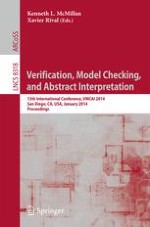This book constitutes the refereed proceedings of the 15th International Conference on Verification, Model Checking and Abstract Interpretation, VMCAI 2014, held in San Diego, CA, USA, in January 2013. The 25 revised full papers presented were carefully reviewed and selected from 64 submissions. The papers cover a wide range of topics including program verification, model checking, abstract interpretation and abstract domains, program synthesis, static analysis, type systems, deductive methods, program certification, debugging techniques, program transformation, optimization, hybrid and cyber-physical systems.
